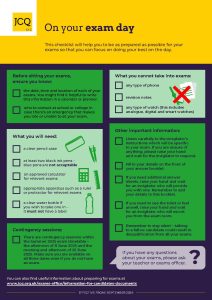On your exam day
This information will help you to be as prepared as possible for your exams so that you can focus on doing your best on the day.
BRIEFING: INSTRUCTIONS FOR CANDIDATES
BRIEFING: INSTRUCTIONS FOR CANDIDATES – View this document here
As an exam candidate you must ensure you are fully prepared for every exam you are taking. You need to understand the rules and what will happen at the time of your exam(s).
The JCQ document has been written to help you – you should read it carefully and follow the instructions at the time of your exam(s).
At the time of your exam(s)
- You must not enter the exam room until invited to do so by the invigilator
- You are under formal examination conditions from the moment you enter the room in which you will be taking your exam(s) until the point at which you are permitted to leave
| This means you must not talk to, attempt to communicate with or disturb other candidates once you have entered the examination room (If you do, this must be reported to the relevant awarding body) Also you must not open the question paper until you are instructed by the invigilator that the exam can begin (If you do, this must be reported to the relevant awarding body) Any breach of examination conditions is considered by the awarding bodies as malpractice* |
- You must listen to and follow the instructions given to you by the invigilator at all times
- The centre number, subject title and paper code, the actual starting and finishing times, and date, of each exam will be clearly displayed and visible to you in the exam room
Before you are permitted to start your exam(s), the invigilator will:
- make sure you are seated according to the set seating arrangements
- tell you that you must now follow the regulations of the exam
- ask you to check that you have been given the correct question paper for the day, date, time, subject, unit/component (and tier of entry, if appropriate) and to put up your hand if you think you have been given the wrong question paper
- tell you to read the instructions on the front of the question paper
- ask you to check that you have all the materials you need for the exam
- tell you about any erratum notices (if applicable) and instruct you about emergency procedures
The invigilator will also remind you that you must:
- hand in any unauthorised items in your possession (this includes mobile phones and watches) if you have not already done so
(This is your final chance. Failure to do so must be reported to the awarding body and may lead to disqualification)
- fill in all the details needed on the front of your answer booklet (or question paper) in black ink
- make sure you fill these details in on any additional answer sheets that you use
- write clearly and in black ink, but you may use pencil for drawings and rough notes
- write in the designated sections of the answer booklet
- write all rough work in your answer booklet and neatly cross it through with a single line (for multiple-choice papers, you must do any rough work in the question booklet)
The invigilator will also remind you that you must not use correcting pens, fluid or tape, erasable pens, blotting paper and you must not use highlighters or gel pens in your answers.
The invigilator will:
- remind you that you must not communicate in any way with, ask for help from or give help to another candidate while you are in the exam room
- tell you when you may complete the details on the front of your answer booklet (You must only do this when the invigilator’s announcement is made)
- tell you when you may open the question paper and begin to write your answers
- tell you the time allowed (the duration) of your paper(s)
The invigilator is not allowed:
- to give you any information or answer any questions from you about the content of your exam paper unless it relates to the instructions on the front of the question paper
- to give you any indication of the time elapsed or remaining for you to complete your exam paper
*Malpractice includes (but is not limited to): A breach of the instructions or advice of an invigilator, supervisor, or the awarding body in relation to the examination rules and regulations; Failing to abide by the conditions of supervision designed to maintain the security and integrity of the examinations; Disruptive behaviour in the examination room or assessment session (including use of offensive language); Introduction of unauthorised material into the examination room; Exchanging, obtaining, receiving, passing on information (or the attempt to) which could be assessment related by means of talking, electronic, written or non-verbal communication. Any candidate who fails to follow the rules may be subject to the indicative sanctions as detailed in the JCQ document Suspected Malpractice: Policies and Procedures 2024-2025 (www.jcq.org.uk/exams-office/malpractice)
Preparing to sit your exams 2024-2025
View this document here
